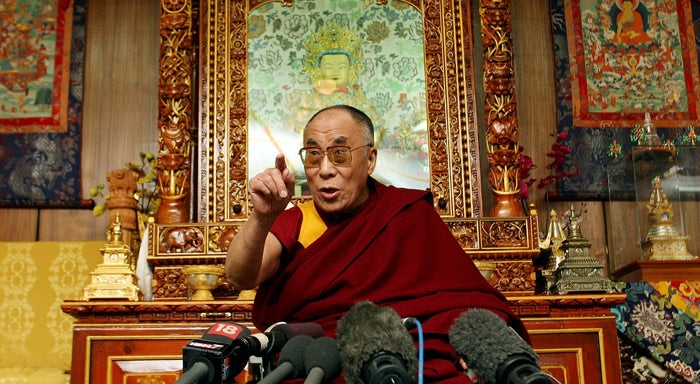Dalai Lama threatens to quit over Tibet violence

Your support helps us to tell the story
From reproductive rights to climate change to Big Tech, The Independent is on the ground when the story is developing. Whether it's investigating the financials of Elon Musk's pro-Trump PAC or producing our latest documentary, 'The A Word', which shines a light on the American women fighting for reproductive rights, we know how important it is to parse out the facts from the messaging.
At such a critical moment in US history, we need reporters on the ground. Your donation allows us to keep sending journalists to speak to both sides of the story.
The Independent is trusted by Americans across the entire political spectrum. And unlike many other quality news outlets, we choose not to lock Americans out of our reporting and analysis with paywalls. We believe quality journalism should be available to everyone, paid for by those who can afford it.
Your support makes all the difference.The Dalai Lama has rejected claims by the Chinese government that he orchestrated the demonstrations in Tibet and said he would stand down as head of the country's exiled government if the violence continued.
The spiritual and political leader yesterday called on both sides to end the violence that has rocked many parts of Tibet in what has been the biggest protest against Chinese rule for two decades.
Speaking in Dharamsala, India, he said: "I say to China and the Tibetans – don't commit violence. Whether we like it or not, we have to live together side by side," adding that "if things become out of control then my only option is to completely resign".
The Dalai Lama's comments came as the Chinese authorities accused him of masterminding the protests, which resulted in a crackdown by troops and police that killed an unknown number of people.
Speaking at a news conference held to mark the end of China's parliament, the National People's Congress, Prime Minister Wen Jiabao said that the Tibetan Buddhists' spiritual leader was attempting to undermine China's hosting of the forthcoming Olympic Games. "There is ample fact – and we also have plenty of evidence – proving that this incident was organised, premeditated, masterminded and incited by the Dalai clique," he said.
A witness in the Tibetan capital said it was quiet after a midnight deadline for a lockdown by security forces ended days of unrest. With Lhasa now firmly in the grip of Chinese security forces, the back and forth between the Dalai Lama and the Chinese represented the political battle that both sides are desperate to win.
In a move underlining a carefully developed image of a peaceful power, Mr Wen also called for talks with its long-time foe Taiwan, which China considers an inalienable part of its territory since Chiang Kai-shek's losing Nationalist Kuomintang fled there after the civil war in 1949, saying China was willing to resume talks with the government.
The olive branch to Taipei serves to further confuse China's critics. The Tibet unrest has triggered a significant stepping-up of security in China in areas where ethnic groups are seeking greater autonomy.
There were reports of heavy weaponry being loaded on to cargo planes destined for Tibet and the restive province of Xinjiang, where separatist Muslims were recently involved in plots to undermine the Olympics. Troops are being deployed in large numbers in trouble spots.
But China's international reputation has also suffered as a result of its violent response to the unrest, jeopardising the goodwill Beijing has generated in the run-up to the Games. Tibetan campaigners say hundreds may have died, while the Chinese government puts the number at 16. It sees itself as very much the victim in the upheaval.
There have been growing calls for a boycott of the Games, although the Dalai Lama has rejected such calls, saying that a boycott would achieve nothing.
The International Olympic Committee president, Jacques Rogge, has also said that there have been no calls for a boycott although Richard Gere, the high profile pro-Tibetan campaigner, said that it would be "unconscionable" to attend the Beijing Games if China did not find a peaceful resolution to the crisis.
"To host an Olympics is a dream shared by people of many generations in this country. I also hope that by hosting the Olympics we will be able to further friendships and co-operation with people from all over the world," Mr Wen said.
Join our commenting forum
Join thought-provoking conversations, follow other Independent readers and see their replies
Comments